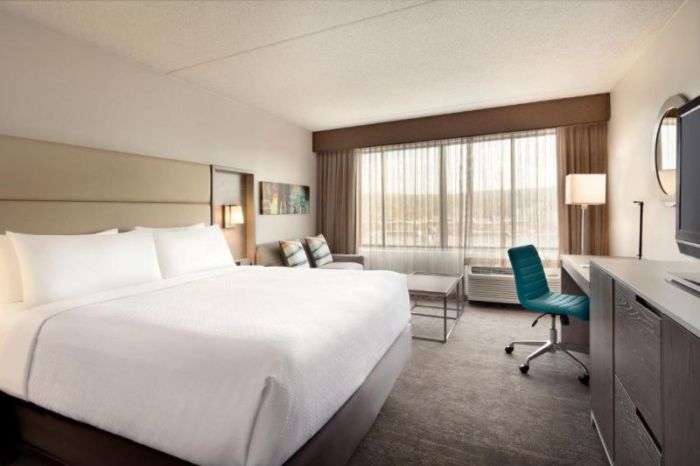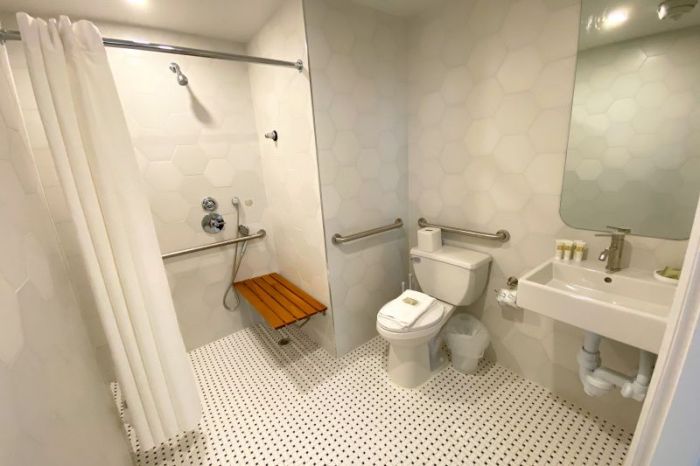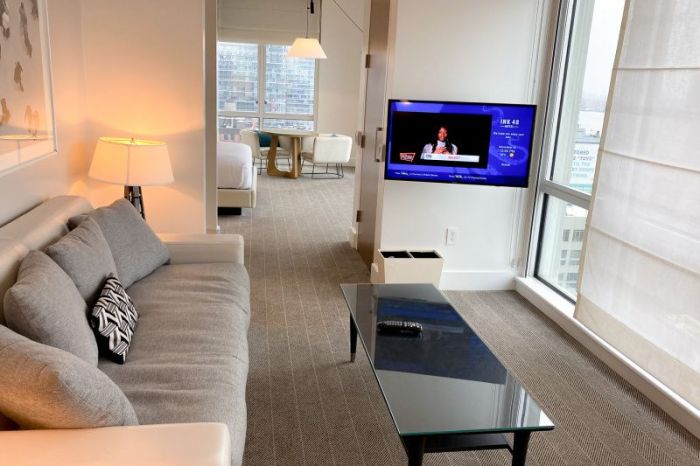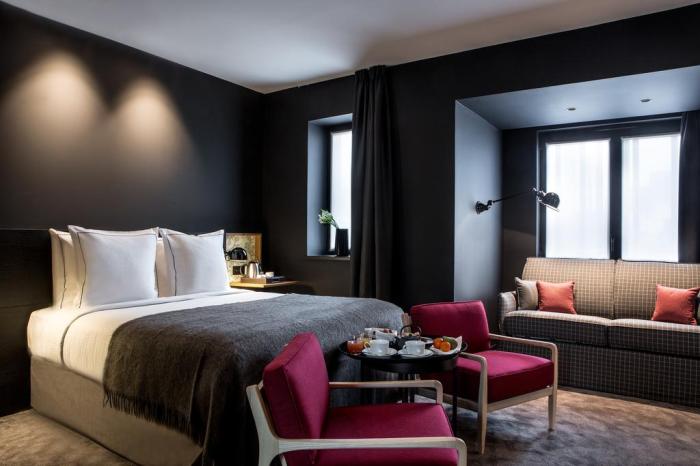Hotels with wheelchair access are essential for ensuring that all travelers can enjoy their journeys without barriers. Accessibility in hotels goes beyond just ramps and elevators; it encompasses a thoughtful design that considers the needs of guests with mobility impairments. With the right features, such as wide doorways, accessible bathrooms, and strategically located amenities, hotels can create an inviting atmosphere that caters to everyone.
Moreover, choosing a location with nearby attractions and services can significantly enhance the experience for guests requiring wheelchair access.
As more travelers prioritize accessibility, understanding how to find and evaluate hotels that meet specific needs becomes crucial. Resources like specialized websites and apps can help guests identify suitable accommodations, while direct communication with hotel staff can clarify any uncertainties before booking. Additionally, comprehensive reviews can provide insights into the true accessibility of various hotels, ensuring a well-informed decision for a comfortable stay.
Accessibility Features of Hotels
Hotels play a pivotal role in ensuring that all guests, regardless of their mobility impairments, have a comfortable and enjoyable stay. Accessibility features are essential for creating an inclusive environment that caters to diverse needs. These features not only enhance the experience for guests with disabilities but also reflect the hospitality industry’s commitment to equality and service excellence.Key accessibility features in hotels include ramps, elevators, and accessible room designs that accommodate various mobility aids.
Additionally, visual and auditory assistance tools play a significant role in enhancing accessibility. Hotels should adopt universally designed spaces that promote ease of movement and access throughout the premises.
Key Accessibility Features
The incorporation of specific features is vital for hotels to meet the needs of guests with mobility impairments. The following points highlight essential accessibility features that should be considered in hotel designs:
- Wheelchair Ramps: Slope-graded ramps should be strategically placed at entrances, exits, and key areas within the hotel to facilitate smooth access for wheelchair users.
- Accessible Elevators: Elevators should be spacious, equipped with tactile buttons, and have audio announcements to assist guests with visual impairments.
- Wide Doorways: Doorways must be wide enough to accommodate various mobility aids, ensuring easy access to rooms and public areas.
- Accessible Bathrooms: Bathrooms should include grab bars, roll-in showers, and lower sinks for ease of use by individuals with mobility challenges.
- Clear Signage: Visual cues and braille signage guide guests seamlessly throughout the hotel, ensuring they can navigate without assistance.
Integration of Wheelchair Access in Hotel Design
The integration of wheelchair access into hotel design is crucial for creating a welcoming atmosphere. This involves thoughtful planning and execution that considers the diverse needs of all guests. By implementing universal design principles, hotels can ensure that accessibility features are not only functional but also aesthetically pleasing.Incorporating accessibility into hotel architecture can include features such as:
- Open Floor Plans: Designing open spaces allows for easier movement and navigation for guests using wheelchairs.
- Adaptive Furnishings: Furniture should be chosen for comfort and accessibility, allowing for easy use and maneuverability.
- Accessible Parking: Designated parking spaces near entrances make access more convenient for guests with mobility impairments.
Importance of Location
The location of a hotel significantly influences the accessibility of nearby attractions and services. A strategically located hotel can enhance the overall experience for guests with mobility impairments. Proximity to public transport, restaurants, and tourist attractions can facilitate easier access and convenience.Hotels should consider the following aspects regarding location:
- Nearby Public Transport: Accessibility to buses and trains with low-floor or ramp-equipped vehicles ensures guests can explore the area without barriers.
- Availability of Accessible Attractions: Hotels located near attractions that offer accessibility features enhance the potential for a fulfilling experience for all guests.
- Convenient Services: Proximity to medical facilities or pharmacies can provide peace of mind for guests with specific needs.
Resources for Finding Accessible Hotels

Finding hotels that accommodate wheelchair access can be a daunting task, especially for travelers who require specific accessibility features. Fortunately, various resources are available to help make this process easier, ensuring that you can enjoy your stay without any hindrances.There are several websites and apps dedicated to listing accessible hotels, which provide detailed information about the features offered. These platforms are essential for travelers seeking to book accommodations that meet their accessibility needs.
If you’re a music lover, staying at hotels with music festivals can enhance your experience. Imagine enjoying live performances right at your doorstep, creating lasting memories with fellow festival-goers. These accommodations often feature unique amenities that cater to music enthusiasts, making them the perfect choice for your next getaway.
Below is a list of some of the most reliable resources available:
Specialized Websites and Apps
The following websites and apps can assist you in finding hotels that cater specifically to wheelchair users or those requiring accessibility features. Utilizing these tools can significantly enhance your travel planning experience:
- AccessibleGO: A comprehensive platform that lists hotels and travel destinations with detailed accessibility ratings.
- HandiTravel: This app allows users to find hotels, restaurants, and attractions that are wheelchair accessible.
- Airbnb: Offers a filter for accessible stays, showing properties that meet various accessibility requirements.
- Hotels.com: Features a dedicated accessibility filter to help find hotels with specific amenities.
- Expedia: Provides users with the option to filter hotel searches by accessibility features.
Before finalizing your booking, it is advisable to contact hotels directly to inquire about their specific accessibility features. This can ensure that you have the most accurate information and that the hotel can meet your needs.
Direct Contact Tips
When reaching out to hotels regarding accessibility, consider the following tips to ensure your inquiries are effective:
- Prepare Specific Questions: Ask about room dimensions, bathroom accessibility, and any other relevant features.
- Request Photos: If possible, ask for images of the accessible rooms and facilities to gauge suitability.
- Inquire About Staff Training: Confirm if staff members are trained to assist guests with disabilities.
- Check for Updates: Accessibility features may change, so verify that the information is current.
Additionally, comparing popular travel websites based on their accessibility filters can be beneficial. Below is a comparison table that highlights how different platforms approach accessibility:
| Website/App | Accessibility Filters | User Reviews on Accessibility |
|---|---|---|
| AccessibleGO | Dedicated accessibility ratings and detailed descriptions | Highly rated for accuracy and user feedback |
| Airbnb | Filter for accessible stays with various feature options | Mixed reviews, depends on individual listings |
| Expedia | General accessibility filter available | Limited user feedback on accessibility |
| Hotels.com | Accessibility filter with select amenities | Good reviews; many options available |
“Using specialized websites and direct hotel inquiries can simplify the process of finding accessible accommodations.”
Reviews and Recommendations: Hotels With Wheelchair Access

When selecting a hotel with wheelchair access, reviews from previous guests serve as invaluable resources. They offer insights into the actual accessibility features and the quality of service provided. This information helps potential guests make informed decisions based on real experiences rather than just marketing claims.Summarizing guest reviews reveals common themes regarding accessibility features, the responsiveness of hotel staff, and the overall comfort of accommodations for individuals with mobility challenges.
The following sections delve deeper into these reviews, highlight popular hotel chains recognized for their commitment to accessibility, and provide a guideline for writing meaningful reviews regarding accessibility features encountered during hotel stays.
For those who enjoy the night sky, choosing hotels with stargazing offers a magical experience. Picture yourself relaxing under the stars, far away from city lights, with telescopes and expert guides available to enhance your viewing experience. These hotels provide a serene escape, ideal for both couples and families looking to connect with nature.
Guest Reviews Summary
Guest reviews often highlight crucial aspects of hotels that cater to wheelchair users, such as the ease of navigating to and within the property. Key points include:
- Ease of Access: Many guests emphasize the importance of ramps, elevators, and automatic doors, which facilitate smooth entry and movement throughout the hotel.
- Room Features: Reviews frequently mention the availability of roll-in showers, grab bars, and wide doorways, all of which significantly enhance accessibility in guest rooms.
- Staff Assistance: Positive comments often note the helpfulness and knowledge of the staff regarding accessibility needs, indicating that a supportive environment greatly enhances the stay for those with disabilities.
- Location and Proximity: Many guests appreciate hotels that are situated near popular attractions with accessible routes, allowing for greater independence during their stay.
Popular Hotel Chains Committed to Accessibility
Several hotel chains have established a reputation for their commitment to accessibility. They provide extensive amenities and services designed specifically for guests with mobility challenges. Notable examples include:
- Marriott Hotels: Known for their comprehensive accessibility guidelines, Marriott offers accessible rooms with features such as visual alarms, lower counters, and path-of-travel accommodations.
- Hilton Hotels: Hilton properties often include accessible features such as wheel-in showers, accessible business centers, and trained staff ready to assist guests with special needs.
- Hyatt Hotels: Hyatt prioritizes accessibility by featuring accessible entrances, adapted rooms, and on-demand services to ensure that all guests feel welcome and comfortable.
- Radisson Hotels: This chain ensures that guests with mobility issues find suitable accommodations, offering accessible parking, rooms, and facilities, along with wheelchair-friendly restaurants.
Guide for Writing Meaningful Accessibility Reviews
Sharing experiences about accessibility features is crucial for helping future guests choose appropriate accommodations. A well-structured review should cover several essential points including:
- Introduction: Begin with a brief description of your stay and the purpose of your visit.
- Accessibility Features: Detail the specific accessibility features available, such as room layouts, bathroom accommodations, and common area accessibility.
- Staff Interaction: Describe your experiences with hotel staff, focusing on their attentiveness and willingness to assist with accessibility needs.
- Overall Experience: Reflect on how accessible features impacted your overall stay, including any difficulties or highlights worth mentioning.
- Recommendations: Give recommendations for other guests with similar needs, suggesting which rooms or areas to request for an optimal experience.
“A well-informed review can empower others to make choices that suit their accessibility requirements, fostering a more inclusive travel environment.”
Funding and Support for Accessible Travel

Accessible travel is crucial for individuals with disabilities, as it allows them to explore the world and enjoy experiences that many take for granted. However, financial constraints can often hinder these opportunities. This section Artikels various funding options and support systems available for travelers in need of accessible accommodations, highlighting the role of organizations dedicated to promoting inclusive travel experiences.
Funding Options for Accessible Travel
Numerous funding options exist to support travelers with disabilities, which can significantly ease the financial burden associated with accessible accommodations and travel-related expenses. These funding avenues include:
- Government Grants: Various governmental bodies provide grants specifically aimed at enhancing accessibility in travel. For example, in the United States, the Administration for Community Living (ACL) offers programs that promote independent living and mobility for disabled individuals.
- Non-profit Organizations: Numerous non-profit organizations, such as the Christopher & Dana Reeve Foundation, offer scholarships or travel funds for individuals with disabilities. These funds often cover transportation, lodging, and other associated costs.
- Accessible Travel Funds: Some specialized travel agencies and organizations offer their own funding programs. For instance, organizations like FODAC (Friends of Disabled Adults and Children) provide resources and travel grants to assist those in need of accessible travel options.
- Corporate Sponsorships: Certain companies focus on promoting inclusivity and may offer sponsorships or grants for individuals with disabilities. For example, travel companies that prioritize accessible tourism might provide discounts or financial support to make travel more feasible.
Role of Organizations in Promoting Accessible Travel
Both governmental and non-governmental organizations play a pivotal role in advocating for accessible travel solutions. These organizations focus on raising awareness, providing resources, and initiating programs that cater to the needs of travelers with disabilities.
- Advocacy Groups: Organizations like the American Association of People with Disabilities (AAPD) advocate for policy changes that enhance accessibility in the travel industry. They work towards ensuring that travel providers comply with accessibility standards.
- Resource Networks: Many organizations compile resources that help travelers locate accessible accommodations and transportation. These networks often provide valuable information regarding accessible hotels, restaurants, and attractions.
- Training Programs: Some organizations offer training for travel industry professionals on how to better accommodate travelers with disabilities, ensuring that their needs are understood and met.
- Accessibility Reviews: Various non-profits and advocacy groups conduct assessments of travel facilities, providing reviews and recommendations on accessible options, thus guiding travelers in their choices.
Grants and Subsidies for Traveling with Disabilities
Grants and subsidies can greatly assist individuals with disabilities in pursuing travel opportunities that may otherwise be financially out of reach. These programs are essential for promoting inclusivity in travel.
- Travel Grants: Many foundations and organizations provide travel grants specifically for people with disabilities. These grants can cover various expenses, including airfare, lodging, and activity costs.
- State and Local Programs: Certain states offer programs that provide financial assistance for residents with disabilities seeking to travel. These programs may vary widely by location, so it’s beneficial for travelers to research local resources.
- Scholarship Programs: Some organizations offer scholarships designed to support specific travel purposes, such as educational trips or recreational activities, aimed at individuals with disabilities.
- Tax Credits: In some regions, tax credits are available for expenses incurred by individuals with disabilities during travel. These credits can help offset costs related to accommodations and transportation.
Future Trends in Hotel Accessibility

The future of hotel accessibility is rapidly evolving, driven by advancements in technology, changes in legislation, and a growing demand from consumers for inclusive travel experiences. As hotels adapt to meet the needs of all guests, innovative solutions are emerging that promise to revolutionize the hospitality landscape.
Emerging Technologies Enhancing Wheelchair Access
Technological advancements are playing a critical role in improving accessibility within the hospitality sector. Smart technologies are transforming the way hotels cater to guests with mobility challenges. Features such as app-controlled room settings, automatic doors, and advanced navigation systems are becoming more common.
- Smart Room Controls: Many hotels are now integrating smart home technology that allows guests to control lighting, temperature, and entertainment systems through voice commands or mobile applications. This convenience enhances the experience for wheelchair users who may have difficulty reaching traditional controls.
- Robotic Assistance: The introduction of robotic concierges and service robots can assist guests with mobility issues, providing them with a more seamless and independent experience during their stay.
- Augmented Reality Navigation: Some hotels are experimenting with augmented reality (AR) applications that can guide guests through their facilities, highlighting accessible routes and amenities, ensuring that users can navigate with ease.
Potential Changes in Legislation Affecting Accessibility Standards, Hotels with wheelchair access
Legislative changes are likely to impact hotel accessibility standards in the coming years. Governments around the world are increasingly recognizing the importance of inclusivity in public accommodations.
- Stricter Building Codes: Upcoming regulations may impose stricter building codes that mandate enhanced accessibility features in new constructions and renovations of existing hotels, ensuring all facilities meet higher standards of inclusivity.
- Incentives for Compliance: Some jurisdictions are considering tax incentives for hotels that exceed current accessibility standards, encouraging operators to invest in improvements.
- International Guidelines: Global organizations, such as the World Health Organization, are advocating for standardized international guidelines, which could influence national policies, promoting uniformity in accessibility across borders.
Consumer Demand Shaping Inclusive Hospitality
Consumer demand is a powerful force driving the hospitality industry toward greater inclusivity. As awareness and advocacy for accessible travel grow, businesses must adapt to meet the expectations of their guests.
- Increased Awareness: With rising advocacy for disability rights, consumers are more informed and vocal about their accessibility needs, prompting hotels to prioritize inclusive designs.
- Social Media Influence: Online platforms allow guests to share their experiences, making hotels more accountable for their accessibility practices. Positive reviews for accessible hotels can significantly boost bookings.
- Targeted Marketing: Hotels are increasingly developing targeted marketing campaigns aimed at individuals with disabilities, highlighting their accessibility features to attract a broader customer base.
“A commitment to accessibility not only enhances the guest experience but also positions hotels as leaders in a diverse and inclusive marketplace.”